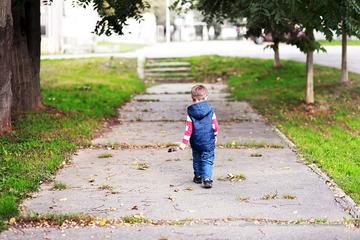Childhood Adversity and Lifetime Resilience

Childhood Adversity and Lifetime Resilience is an interdisciplinary research project, innovatively bringing together historical and psychological approaches to consider pathways to resilience across the life-course. The project is led by Dr Lucy Bowes (Associate Professor at the Department of Experimental Psychology, Medical Sciences Division and Tutorial Fellow at Magdalen College) and Dr Siân Pooley (Associate Professor in the Faculty of History and Tutorial Fellow at Magdalen College).
All societies establish norms that regulate the environment, interactions and treatment of children. The boundaries used to categorise acts and impacts as unacceptable, however, are historically and culturally specific. Studies of child welfare have constructed a linear narrative of how the British state, voluntary organisations and professionals became increasingly attentive to the unique vulnerability and malleability of the young from the 1880s, often in response to unusually publicised cases of shocking abuse or to exceptional events such as child evacuation during the Second World War. Attention is thus focused on adult-led, public and short-term responses to perceived risks. This project alters this agenda by examining children’s experiences of negotiating, often in private, the long-term consequences of growing up in relationships and environments that were considered by some to be damaging. Adversity in childhood is thus repositioned as a widespread, but diverse, experience that sits at the heart of the lives of a sizable minority of the population and that contributes to sustained societal inequalities.
This historical research uses archival records to examine how people who grew up in disadvantaged circumstances were affected by these experiences as they grew to adulthood in twentieth-century Britain. The project seeks to uncover the historically-specific meanings of adversity – including abuse, neglect, poverty, and family breakdown – for the child, for those who provided care, and for wider society. Qualitative (and where appropriate quantitative) analysis focuses on how differences in provision of care, education, medical and psychological interventions, employment, and personal relationships affected children’s short-term and particularly long-term welfare.
We will link this deeply contextualised historical understanding to extensive quantitative psychological research using data spanning 70 years. This analysis considers subjective, social, psychological and physiological outcomes for this same cohort of people across the course of their lives. Information used in this analysis includes longitudinal data from the British Cohort Studies from 1946.
This research brings together the strengths of historical and psychological approaches in pioneering ways, so as to explore the deeply contextualised, quantitatively and qualitatively measured, life-long impacts of adverse childhood experiences. In so doing, the collaboration engages with two central challenges in social historical and psychological scholarship – of how to integrate subjectivity into social history and of how to integrate social and historical context into psychological analyses of individual characteristics. This project thus seeks to be conceptually, as well as empirically, innovative.
We hope that the findings of the research project will also contribute to improvements in contemporary policy and practice. We cannot understand the ways in which early negative environments shape contemporary inequalities – and what care, interventions and relationships helped some men and women – without first knowing how people understood and experienced adversity when young. Our Changing Lives workshop brings together a network of researchers and practitioners to share evidence for what works to support children who have experienced maltreatment and adversity.
Changing Lives: childhood experience, cumulative adversity, and supportive environments across the life course
We know that exposure to early life adversity is associated with poor psychological and physical outcomes across the life course. However, pathways to resilience and potential turning points remain largely under-studied. This project innovatively combines evidence and approaches from psychology, epidemiology, and history to investigate how adversity and inequalities shape people’s lives.
This project, funded primarily by the Calleva Foundation, has three research strands. The first is an in-depth epidemiological analysis of detailed longitudinal databases in order to examine the relationships between early experiences of adversity and adult mental and physical health outcomes, and to identify potential mechanisms of change. The second is an in-depth qualitative and quantitative study of the lives of people born in Oxfordshire in the mid-twentieth century. This will explore how early experiences, family relationships, and support structures across the life course influence the health and well-being of older adults. The third is an investigation of childhood experiences and the changing impact of adversity and inequalities, using psychological and historical evidence.
This research brings together the strengths of historical and psychological approaches in pioneering ways, so as to explore the deeply contextualised, quantitatively and qualitatively measured, life-long impacts of cumulative adversity in childhood. In so doing, the collaboration engages with two central challenges in social historical and psychological scholarship – of how to integrate subjectivity into social history and of how to integrate social and historical context into psychological and epidemiological analyses of individual characteristics.
The research project was inspired by the ‘Humanities and Science’ programme, based at TORCH (The Oxford Research Centre in the Humanities) and funded by the Andrew W. Mellon Foundation. The programme is designed to create new interest in, and opportunities for, research that reaches between the humanities and sciences.
Any students, post-doctoral researchers, practitioners or other individuals interested in finding out more about working as part of this project is welcome to contact Lucy Bowes and Siân Pooley via the email addresses below.
You can follow the project on Twitter: https://twitter.com/ResilienceOx and receive updates on their blog:https://resilienceox.wordpress.com/
Image © Depositphotos.com/lenanet
Contact:
resilience@torch.ox.ac.uk
Siân Pooley
sian.pooley@magd.ox.ac.uk
Lucy Bowes
lucy.bowes@psy.ox.ac.uk


